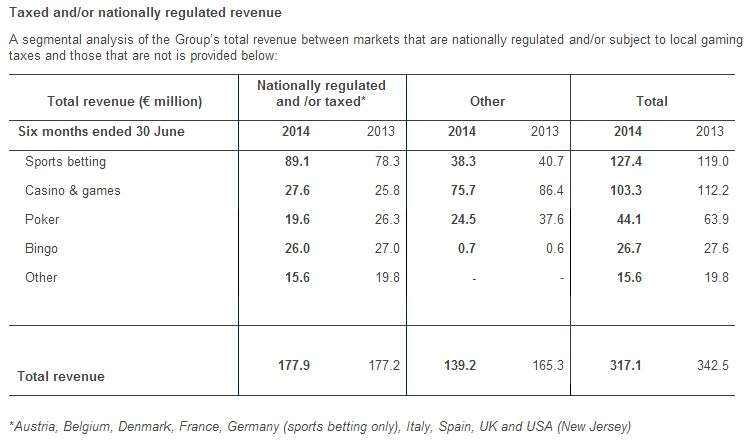Bwinparty Online Poker Revenue Dips
Executives for Gibraltar-based bwin.party have announced an ongoing series of cost-cutting measures designed to reverse the company’s indifferent economic results, following the release on Friday of the firm’s first-half financial results. The company’s year-over-year core operating profit fell to €46.4 million, off by nearly a fourth from the €60.7 million operating profit posted in the first half of 2013.
 The major culprit buried within bwin.party’s poor performance is a sharp global dropoff in online poker revenue. According to the company’s first-half financials, the poker segment of the company’s business dropped by 37%, compared to a year earlier.
The major culprit buried within bwin.party’s poor performance is a sharp global dropoff in online poker revenue. According to the company’s first-half financials, the poker segment of the company’s business dropped by 37%, compared to a year earlier.
Bwin.party’s Chief Executive Officer, Norbert Teufelberger, said the following in a prepared statement:
“Trading during the first half of 2014 was mixed with a solid performance from sports betting more than offset by year-on-year declines in casino and poker, particularly in countries that were no longer a core area of focus. We are on-track with our current cost saving measures, however it is clear that a more fundamental approach is needed to turnaround our commercial and operational performance. This requires a major change: we are simplifying our structure to accelerate the execution of our plans to drive revenue growth, increase our focus on customers in nationally regulated and/or taxed markets, and further reduce infrastructure costs. This new approach will also allow us to consider alternative financing and corporate structures in order to create additional value. We are confident that the steps we are taking will underpin our financial performance and remain confident about the full year outlook.”
A look inside the company’s poker numbers shows that the loss was across the board — and across Europe — though the company cited its withdrawal from the relatively small Greek online marketplace as a contributing factor. Here’s how bwin.party detailed its first-half revenue:
Poker-related specifics included along with the financial statement declared that “poker active player days” were down by 32%, translating to a slight decline in revenue on a per-player-per-day basis as well.
Though bwin.party cited new revenue from the fledging New Jersey online gambling market in the United States, that operation is still producing net losses for the company, which aren’t expected to end any time soon. New Jersey’s player numbers have seen only slow growth in recent months, and the possible entry of the Amaya-owned PokerStars might result in overall growth for the New Jersey market, but would not necessarily mean improved numbers for any single specific existing operator.
Bwin.party’s game plan, as expected, will be to pare costs wherever possible. The company is in the process of trimming €30 million in operating costs during the 2014 fiscal year, and has announced plans to trim another €15 million in 2015.
Bwin.party has also been enmeshed in internal power struggles focusing on the company’s lackluster performance. The company averted a proxy battle brought by dissident shareholders this year that sought to overthrow the existing board of directors and replace Teufelberger as CEO. That shareholder revolt was led by Jason Ader, whose investment firm, Spring Owl, bought 5% of bwin.party early in 2014. Ader’s investor revolt was quelled only after an Ader associate was granted a seat on bwin.party’s board.
Collectively, the news has kept bwin.party’s share price in the range of penny stocks. Though collectively valued at £660 million (about USD $1.1 billion), that figure still represents only a small fraction of the company’s valuation as far back as 2006, in the days prior to the United States’ passage of its UIGEA, which necessitated the old PartyGaming’s exodus from the United States. (Bwin, which existed separately before the two companies merged, never served American players.) Bwin.party’s share price today, £0.90, actually represents a slight uptick from the stock’s lowest point.
The company’s financials did offer some good news. Sportsbetting continued to be a strong performer, with total revenue up 7% year-to-year. It’s no surprise, however, that bwin.party is a prominent member of the efforts led by the Gibraltar Betting and Gaming Association. The GBGA, which represents bwin.party and nearly 30 other online-gaming firms, is staunchly fighting a new UK tax which seeks to repatriate revenue from online gambling by UK punters, and which would necessarily mean another financial hit for companies such as bwin.party.
Whether the sagging numbers for bwinparty online poker can be turned around remains to be seen. The sag in the company’s online-poker numbers comes amid several financial concerns and lessened overall profitability, a sure sign that for bwin.party, more changes are in the works.




















COMMENTS